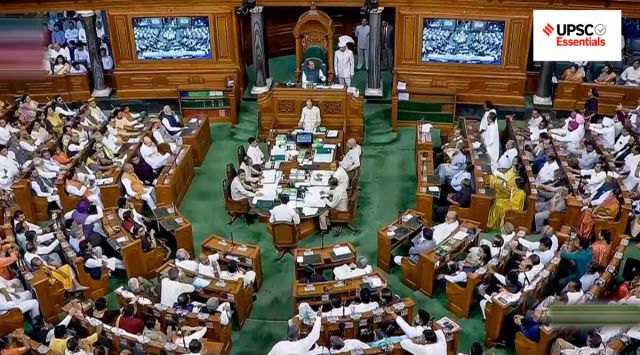- India
- International
UPSC Essentials | Weekly news express : Major Bills of Monsoon Session 2023
Dive deep into our special edition on major Bills passed by the Parliament during this Monsoon Session.
 In today's special edition learn about the major Bills passed by the Parliament in the monsoon session. (PTI)
In today's special edition learn about the major Bills passed by the Parliament in the monsoon session. (PTI) 🚨 This story is part of our special initiative for UPSC and other competitive exams. Look out for UPSC KEY on weekdays and UPSC Essentials everyday, Weekly news express with MCQs, Key Terms of the past week, quizzes as well as The Indian Express 360° Upsc Debate, Society & Social Justice, UPSC Mains Practice, Art and Culture with Devdutt Pattanaik, UPSC Ethics Simplified, Experts Talk, and more. 🚨
The Indian Express’ UPSC weekly news express covers some of the important and burning topics of current affairs news from this week to help you prepare for UPSC-CSE. Try out the MCQs and check your answers provided towards the end of the article.
The Monsoon Session, 2023 of Parliament which commenced on 20th of July, 2023 was adjourned sine die on the 11th of August, 2023. This week’s news express covers major Bills passed by both Houses during the Monsoon Session. Let’s learn…
NOTE: The Bill becomes an Act only after the President has given assent to it.
1.The Cinematograph (Amendment) Bill, 2023
— It is aimed at curbing film piracy, revamp age-based certification given by the Central Board of Film Certification (CBFC) as well as bring uniformity in the categorisation of films and content across platforms.

— The new law would make piracy a criminal violation punishable by up to three years in prison, a fine of up to five per cent of the production cost of the film, or both.
— This is the first substantial amendment to the Cinematograph Act 1953 since 1984 when the minimum punishment for an offence relating to a video film was introduced.
— The Bill also seeks to give CBFC the authority to grant films with a separate certificate for their display on television or other media; as only Unrestricted Public Exhibition (UA) category films can be shown on television, as per officials. The Board may also refuse the exhibition of films, officials say, adding that the Bill allows for blocking of websites and URLs hosting pirated content under the Information Technology Act.
— “The Bill will also lead to the coverage of online gaming content and online advertising,” official sources said.
— Information and Broadcasting Minister Anurag Thakur said that the Bill has provisions to curb transmission of pirated film content on the internet, and will address the issue of unauthorised recording and exhibition of films.
— The Bill prohibits carrying out or abetting unauthorised recording and exhibition of films. Officials said an unauthorised exhibition means the public exhibition of an infringing copy of the film for profit at a location not licensed to exhibit films or in a manner that infringes upon the copyright law.
— However, certain exemptions will apply to the above offences, such as in cases such as private or personal use, reporting of current affairs, or review or critique of that work. Under the current Act, the certificate issued by CBFC is valid for 10 years. The new Bill provides that the certificates will be perpetually valid.
2. The Constitution (Scheduled Tribes) Order (Third Amendment) Bill, 2023
— It aims for inclusion of Hattee community of Trans Giri area of seeks for inclusion of Hattee community of Trans Giri area of Sirmour district in the list of Scheduled Tribes. Sirmour district is in Himachal Pradesh.
3. The Constitution (Scheduled Tribes) Order (Fifth Amendment) Bill, 2023
— It aims for inclusion of Bhuinya, Bhuiyan, and Bhuyan communities as synonyms of the Bharia Bhumia community.
— It also aims to include Dhanuhar, Dhanuwar, Kisan, Saunra, Saonra and Binjhia communities in the list of Scheduled Tribes in Chhattisgarh.
— Also, it includes three Devanagari versions of the name of the Pando community in Chhattisgarh.
4. The Biological Diversity (Amendment) Bill, 2023
— It seeks to address concerns of several central ministries, state governments, researchers, industry, and other stakeholders, regarding the implementation of the 20-year-old law that is meant to preserve the country’s biological diversity and to ensure its sustainable use.
— Among other things, the amendments aim to encourage Indian systems of medicine like Ayurveda, attract more foreign investment in the preservation and commercial utilisation of India’s biological resources, and simplify and streamline processes so that it is easy for everyone to comply with its provisions.
According to the bill,
(i) reduce the pressure on wild medicinal plants by encouraging cultivation of medicinal plants;
(ii) encourage Indian system of medicine;
(iii) facilitate fast-tracking of research, patent application process, transfer of research results while utilising the biological resources available in India without compromising the objectives of United Nation Convention on Biological Diversity and its Nagoya Protocol;
(iv) decriminalise certain provisions;
(v) bring more foreign investments in the chain of biological resources, including research, patent and commercial utilisation, without compromising the national interest.
— India’s Biological Diversity Act of 2002 was enacted by the government of Prime Minister Atal Bihari Vajpayee with these objectives in mind. It set up a National Biodiversity Authority as a regulatory body, and prescribed the conditions in, and purposes for, which biological resources could be utilised. The purposes mainly related to scientific research and commercial use.
— The Bill passed makes several amendments to the 2002 Act, addressing most of the concerns raised by the practitioners of traditional systems of medicine, the seed sector, and the pharmaceutical industry.
— Certain categories of users of biological resources, like practitioners of Indian systems of medicine, have been exempted from making payments towards the access and benefit-sharing mechanism.
— Companies registered in India and controlled by Indians are now treated as Indian companies, even if they have foreign equity or partnership, thereby reducing the restrictions on them.
— Provisions have been included to speed up the approval process in cases of use of biological resources in scientific research, or for filing of patent applications.
5. The Mines and Minerals (Development and Regulation) Amendment Bill, 2023
— The bill seeks to allow the private sector to mine six out of 12 atomic minerals, including lithium, and deep-seated minerals such as gold and silver.
— Earlier, all 12 atomic minerals were reserved for mining and exploration by state-owned entities.
— The atomic minerals which will be opened for private sector exploration are lithium (used for manufacturing batteries for electric vehicles and energy storage devices), beryllium, niobium, titanium, tantalum and zirconium.
— The bill also empowers the central government to exclusively auction mining lease and composite licence for certain critical minerals.
— Deep-seated minerals include gold, silver, copper, zinc, lead, nickel, cobalt, platinum group of minerals and diamonds. They are difficult and expensive to explore and mine as compared to surficial or bulk minerals.
6. Offshore Areas Minerals (Development and Regulation) Amendment Bill, 2023
— It aims to provide a fixed 50-year production lease for offshore minerals.
— Coal and Mines Minister Pralhad Joshi said the Bill aims to create a transparent auction route for allocation of mines.
— The Bill also seeks to provide for grant of production lease to private sector only through auction by competitive bidding.
— It also provides for grant of operating rights without competitive bidding to a government or a government company, or a corporation in the mineral-bearing areas reserved by the central government.
7. The Forest (Conservation) Amendment Bill, 2023
— The Bill to amend the Forest (Conservation) Act, 1980, passed by Lok Sabha with voice vote, exempts certain kinds of infrastructure or development projects from the need to get forest clearance, which is mandatory at present. These include “strategic linear projects of national importance and concerning national security” situated within 100 km of international borders.
— Even non-linear projects involving the creation of “security related infrastructure” would remain exempt, if the area of forest land to be diverted is restricted to 10 hectares.
— In Naxal-affected areas, projects involving diversion of up to five hectares of land for “defence related” infrastructure or public utilities would no longer be covered by the provisions of the Forest (Conservation) Act. But all these projects would still have to carry out compensatory afforestation, mandated by another law.
— The amendment Bill, in fact, renames the parent legislation, the Forest (Conservation) Act, 1980, to Van (Sanrakshan Evam Samvardhan) Adhiniyam, which translates to Forest (Conservation and Augmentation) Act. Besides being in Hindi, the new name is a reflection of a new focus on afforestation and reforestation activities, with the objective of increasing India’s forest cover and fulfilling its international commitment of creating an additional carbon sink of 2.5-3 billion tonnes by 2030.
— These objectives have been included in the preamble to the proposed amended Act. The original Act did not have any preamble.
“The primary objective of this Bill is to increase the forest area of the country to meet our goals of conservation of forests, conservation of biodiversity and the challenges posed by climate change… That is why we have decided to drop the English word ‘forest’ and replaced it with van sanrakshan aur samvardhan, which is closer to the vocabulary of our people,” Environment Minister Bhupender Yadav said in Lok Sabha.
JUST FYI: Green cover diversion– About 41 lakh hectares of forest land were cleared for non-forest purposes between 1951 and 1976, govt data says. In the 43 years since the law, about 9.83 lakh hectares were diverted.
— A major feature of the Bill is the encouragement provided for private forests and agro-forestry projects. The amendment ensures that private forests and agro-forestry would not be considered forests in the traditional sense, which means these too would be exempt from the provisions of the original Act. That would ensure that farmers or owners of these private forests can harvest their lands, for commercial or other uses, without the need for acquiring forest clearance. This decision had been under consideration for a long time and could potentially result in a major growth in agro-forestry projects.
— By lifting the restrictions on the cultivation of private forests, the government is hoping for a significant increase in forest cover, which will help India in achieving its international commitment and also inch towards the stated objective of putting one-third of its area under forest cover.
— The Bill adopts many features of the Mines and Minerals (Development and Regulation) Act, 1957 like the establishment of trusts for mining affected persons and encouraging exploration etc.
8. The Jan Vishwas (Amendment of Provisions) Bill, 2023
— The Bill seeks to amend 183 provisions of 42 Acts administered by 19 ministries with the aim of reducing compliance burden on individuals and businesses.
— It will affect many areas like media, industry, trade, information technology, copyright, motor vehicles, cinematography, etc.
— The Bill seeks to decriminalize minor offences. Such offences that do not involve any harm to the public interest or national security are aimed to be replaced them with civil penalties / administrative actions.
— The Bill converts many fines to penalties, so that court prosecution would not be necessary to administer punishments and removes imprisonment as a punishment for several offences. All offences under the Post Office Act of 1898 are being removed.
“Yet another novelty involved in the proposal is an increase of 10 per cent of the minimum amount of fine and penalty levied, after the expiry of every three years, once the bill becomes a law,” according to the statement of objects and reasons.
— Introducing the bill in Rajya Sabha, Minister of Commerce and Industry Piyush Goyal said it will promote the ease of doing business, and said a working group has been formed to take this forward.
— The working group has representatives from industry associations, business chambers, legal professionals, legal experts and representatives from seven ministries as well as from the National Housing Bank (NHB), National Bank of Agriculture and Rural Development (NABARD), and the Central Pollution Control Board (CPCB).
— Among Acts which will be amended through the Bill are the Press and Registration of Books Act, the Boilers Act, the Indian Forest Act, the Drugs and Cosmetics Act.
9.The Registration of Births and Deaths (Amendment) Bill, 2023
— It allows the use of a birth certificate as a single document for admission to an educational institution, issuance of a driving licence, preparation of voter list, Aadhaar number, registration of marriage or appointment to a government job.
— The legislation will help create a national and state-level database of registered births and deaths which eventually would ensure efficient and transparent delivery of public services and social benefits and digital registration.
10.The Mediation Bill, 2023
— Mediation is a procedure to amicably resolve a dispute between two contesting parties, with minimum intervention of the court.
— The Bill aims to “promote and facilitate mediation, especially institutional mediation, for resolution of disputes, commercial or otherwise, enforce mediated settlement agreements, provide for a body for registration of mediators, to encourage community mediation and to make online mediation as acceptable and cost effective process and for matters connected therewith or incidental thereto.”
— Noting that nearly 70,000 cases are pending in Supreme Court, 60 lakh cases in high courts, and almost 4 crore cases in district and subordinate courts, Meghwal said the government has given priority to reduce pendency of cases in courts and that mediation centres will get legal support through this Bill.
— Replying to the discussion on the bill, Law and Justice Minister Arjun Ram Meghwal said mediation is not a new concept for an ancient country such as India. “The government brought the Bill so that problems of people, especially of the poor, are solved.,” he said.
11. The Inter-Services Organisations (Command, Control and Discipline) Bill, 2023
— The bill seeks to empower Commander-in-Chief and Officer-in Command of Inter-Services Organisations with all disciplinary and administrative powers so that they take decisions related to personnel serving in or attached to such organisations.
— At present, all Army, Navy and IAF personnel are governed by their service-specific acts.
— While service personnel serving in or attached to an Inter-Services Organisation will continue to be governed by their respective Service Acts, the enabling bill when enacted will empower heads of Inter-Services Organisations to exercise all the disciplinary and administrative powers as per the existing service acts, and related rules and regulations, irrespective of the service they belong to.
— More importantly, it also empowers the central government to constitute an Inter-Services Organisation, thus paving the way for the creation of integrated theatre commands — a major military reform on cards.
— Speaking about the bill in the Rajya Sabha on Tuesday, Union Defence Minister Rajnath Singh said considering the new challenges involved in modern warfare which is more technology and network-centric, the bill will aid better coordination among the defence forces, and bring about better jointness and integration within the military.
What will change with the enactment of the bill?
— The heads of the existing inter-services organisations presently do not have these powers and thus any disciplinary or administrative action against personnel attached to these organisations have to be referred to their respective services.
— The inter-services organisations, though not explicitly referred to as so, include the Strategic Forces Command, the Andaman and Nicobar Command and joint training establishments such as the National Defence College, among others.
— The enactment of the Bill will ensure maintenance of effective discipline in inter-services establishments by their heads, no requirement of referring personnel undergoing disciplinary proceedings to their parent services, and faster disposal of cases of misdemeanour or indiscipline.
— This will potentially save both public resources and time.
Is this bill a precursor to theaterisation?
— Responding to a question on the military’s theaterisation move, the defence minister had said in the house that it would be premature to speak about it.
— He had, however, added that if theaterisation happens, this Act, through a normal notification, would be effective on theatre commands too.
Theaterisation or establishment of theatre commands is a major military reform that seeks to roll the existing individual commands of the three services into tri-services organisations with a common military aim.
— With the Indian Armed Forces drawing up the finer details of the integrated theatre commands, this bill can be considered one of the several steps paving the way for their establishment. Currently, the plans are to establish three theatre commands—one facing Pakistan, one facing China, and a maritime theatre command, largely taking care of the peninsular India.
This is because every integrated theatre command will have components of the three services and will be headed by a theatre commander of one of the services.
— The bill will empower the theatre commander or even those reporting to him to take disciplinary or administrative action against personnel attached to that specific theatre command without having to refer those cases to the individual services of the personnel. However, this would be first notified through a separate government notification.
(Source: The inter-services organisation bill and how it paves the way for establishment of theatre commands by Amrita Nayak Dutta)
12. The Indian Institutes of Management (Amendment) Bill, 2023
— The Bill aims to,”provide for (i) alignment of IIM Act with Acts governing the IITs and other Institutes of National Importance. (ii) inclusion of NITIE, Mumbai in the schedule of the IIM Act, 2017 and renaming NITIE, Mumbai as IIM Mumbai.”
13. The National Dental Commission Bill, 2023
— It seeks to repeal the Dentists Act, 1948, and proposes to set up the National Dental Commission (NMC) to regulate dental education and the profession. It also aims at making dental education affordable and quality oral healthcare accessible.
14. The National Nursing and Midwifery Commission Bill, 2023
— It aims at setting up the National Nursing and Midwifery Commission (NNMC) and repealing the Indian Nursing Council Act, 1947.
— The Bill provides for regulation and maintenance of standards of education and services by nursing and midwifery professionals, assessment of institutions, maintenance of a national register as well as state registers.
15. The Constitution (Scheduled Castes) Order Amendment Bill, 2023
— It seeks inclusion of two communities of Chhattisgarh- ‘Mahra’ and ‘Mahara’ in the list of Scheduled Castes (SC).
16.The Coastal Aquaculture Authority (Amendment) Bill, 2023
— It aims to decriminalise the offences committed in carrying out coastal aquaculture activities and ensure ease of doing business.
According to PTI:
“The Coastal Aquaculture Authority (Amendment) Bill seeks to expand its scope, remove regulatory gaps and reduce the compliance burden without diluting environmental protection rules in the coastal areas.
It removes provision of imprisonment for a period of up to three years and imposes only a penalty in line with the principle of decriminalising civil transgressions.
It also seeks to fine-tune the operational procedures of the Coastal Aquaculture Authority to make it more responsive to the needs of the stakeholders, promote newer forms of environment-friendly coastal aquaculture like cage culture and seaweed culture, and usher in global best practices in this sector, including mapping and zonation of aquaculture areas, quality assurance and safe aquaculture products.
The bill aims to encourage the establishment of facilities in areas having direct access to seawater to produce genetically improved and disease-free broodstocks and seed for use in coastal aquaculture, besides preventing the use of antibiotics and pharmacologically active substances, which are harmful to human health in coastal aquaculture.
The amendment bill provides for broad-basing “coastal aquaculture” to comprehensively cover all activities of coastal aquaculture under its purview.
It removes ambiguity in the principal Act between farm and other verticals of coastal aquaculture.
Many of administrative matters which were ambiguous have been suitably resolved under the bill for administrative efficiency and accountability.
The bill provides that the registration granted under the Coastal Aquaculture Authority Act shall prevail and be treated as valid permission under CRZ notification with the intention of enabling lakhs of small marginal aquaculture farmers to avoid the possible need for obtaining CRZ clearances from multiple agencies.”
17. The Pharmacy (Amendment) Bill, 2023
— “Any person whose name has been entered in the register of pharmacists maintained under the Jammu and Kashmir Pharmacy Act, 2011, or possesses qualification (medical assistant/ pharmacists)… shall be deemed to have been entered in the register of pharmacists prepared and maintained under Chapter IV of this (Pharmacy) Act,” said the statement of objects and reasons of the bill.
— Basically it allows persons qualified or registered under the Jammu and Kashmir Pharmacy Act to be registered as pharmacists under the Pharmacy Act, thus doing away with the ambiguity with regard to the two legislations.
— Piloting the Pharmacy (Amendment) Bill, 2023, Health Minister Mansukh Mandaviya said that changes will increase job opportunities for the youth of Jammu and Kashmir.
— The bill, which was passed by voice vote in the Lower House, seeks to do away with issues concerning the status of persons registered or qualified under the Jammu and Kashmir Pharmacy Act.
— Under the current dispensation, registration under the Pharmacy Act is mandatory for persons practising pharmacy in the country.
18. The Central Goods and Services Tax (Amendment) Bill, 2023
&
19. The Integrated Goods and Services Tax (Amendment) Bill, 2023
— The amendments pertain to insertion of a provision in the Schedule III of the CGST Act, 2017, to provide clarity on the taxation of supplies in casinos, horse racing and online gaming.
— The amendment in IGST Act relates to inserting a provision to impose GST liability on online money gaming provided by offshore entities. Such entities would be required to get GST registration in India.
— The amendments will also provide for blocking access to online gaming platforms located overseas in case of failure to comply with registration and tax payment provisions.
— The amendments to the Central GST (CGST) and Integrated GST (IGST) laws were approved by the GST Council last week.
— The council had approved levy of 28 per cent GST on full face value of entry level bets in online gaming, casinos and horse racing.
20. The Government of National Capital Territory of Delhi (Amendment) Bill, 2023
According to PTI,
The bill does away with the contentious Section 3A of the ordinance that held that the Delhi legislative assembly will not have control over services under Entry 41 of List II of the Seventh Schedule of the Constitution.
Entry 41 of List II of the Seventh Schedule of the Constitution pertains to the State public services and State Public Service Commission.
The bill, like the ordinance, provides for the establishment of the National Capital Civil Services Authority (NCCSA), which will comprise the chief minister who will serve as the chairperson, the principal home secretary of Delhi as the member secretary and the chief secretary of Delhi, who will serve as a member.
“The Authority shall have the responsibility to recommend the transfers and postings of all Group ‘A’ officers and officers of DANICS serving in the affairs of the government of National Capital Territory of Delhi but not officers serving in connection with any subject matter, either fully or in part, connected with Entries 1, 2 and 18 of List II of the Seventh Schedule to the Constitution; and Entries 64, 65 and 66 of List II of the Seventh Schedule to the Constitution… which is connected therewith or incidental thereto, to the Lieutenant Governor…,” it said.
“Entries 1, 2 and 18 of List II of the Seventh Schedule of the Constitution relate to Public order, Police and Land. Entries 64, 65 and 66 of List II of the Seventh Schedule to the Constitution relating to offences against laws with respect to any of the matters in the list, jurisdiction and powers of all courts, except the Supreme Court and fees in respect of any of the matters in this list.” The bill states that the “quorum for the meeting of NCCSA shall be of two members”. This indicates that despite the absence of the chief minister, the other two members can hold the meeting.
It empowers the Lt Governor to approve the recommendations of the NCCSA or ask for a reconsideration. It also that in case of a difference of opinion, the decision of the Lt Governor shall be final.
The bill states that in case the secretary to the Council of Ministers is of the opinion that the proposal considered and decided by the council is not in accordance with the provisions of any law, “it shall be the duty of the Secretary to the Council of Ministers to bring it to the notice of the Lieutenant Governor for taking a decision thereon”.
“Any matter which is likely to bring the government of National Capital Territory of Delhi into controversy with the central government or with any state government, the Supreme Court of India or the High Court of Delhi and such other authorities as may be determined, the Secretary to the Department concerned shall, as soon as possible, bring it to the notice of the Lieutenant Governor, the chief minister and the chief secretary in writing,” it says.
The chief secretary and the secretary to the department concerned shall be responsible for compliance with the provisions of the GNCTD (Amendment) Act, and “when either of them considers that there has been any material departure from the same, instead of giving effect to such departure, he shall personally bring it to the notice of the minister in-charge, the chief minister and the Lieutenant Governor immediately in writing”.
The Bill also states that the power to appoint authorities, board, and commissions will be with the President for any law of Parliament while for laws made by the Delhi legislative assembly for the time being in force, the NCCSA shall recommend a panel of suitable persons for constitution or appointment or nomination by the Lt Governor.
The bill also does away with the provision that mandated the NCCSA to submit an annual report to the Centre and Delhi government, which will be tabled in Parliament and the Delhi Legislative Assembly.
21. Digital Personal Data Protection bill
According to PTI,
“It aims to protect the privacy of Indian citizens while proposing a penalty of up to Rs 250 crore on entities for misusing or failing to protect digital data of individuals.
Companies handling user data will be required to safeguard the individual’s information, and instances of personal data breach have to be reported to the Data Protection Board (DPB) and the user.
Data of children can be processed after consent from guardians, as per the DPDP law. The Lok Sabha had approved the bill on August 7. The government expects to implement the Act within 10 months, IT Minister Vaishnaw had said earlier this week.
The bill lays down the manner in which companies should process users’ data, and gives the government power to seek information from firms and issue directions to block content on the advice of a data protection board appointed by the Union government. It allows users the right to correct their personal data.
The bill applies to the processing of digital personal data in India, where the personal data is either collected in digital form or in a non-digitised format and subsequently digitised.
The bill defines ‘personal data’ broadly to include any data about an individual who is identifiable by or in relation to such data. ‘digital personal data’ is defined to mean personal data in digital form.
DPDP gives the government powers to exempt state agencies from the law.
“The Digital Personal Data Protection Bill, 2023 a bill to provide for the processing of digital personal data in a manner that recognises both the right of individuals to protect their personal data and the need to process such personal data for lawful purposes and for matters connected therewith or incidental thereto,” the DPDP bill said.
It moots creation of Data Protection Board of India to handle grievances of individuals around personal data privacy if data fiduciaries or firms using personal data fail to address individuals’ complaints.”
22. Anusandhan National Research Foundation Bill
According to PTI,
It aims “to set up a national agency to fund research across universities in the country.
The bill seeks to set up a Rs 50,000-crore fund, with a sizeable contribution from the private sector by tapping into the corporate social responsibility (CSR) funds, to “seed, grow and promote” research and development (R&D) and foster a culture of research and innovation throughout India’s universities, colleges, research institutions, and R&D laboratories.
The National Research Foundation (NRF) will be set up with a budget of about 50,000 crore for a period of five years, with Rs 10,000 crore from the government, Rs 4,000 crore from the Science and Engineering Research Board (SERB) and Rs 26,000 crore from places like the private sector, from philanthropists or other aid.
The minister said with the formation of NRF, India will join other countries in having such an organisation and expressed hope that it will soon surpass them.
Explaining the need for the bill, the minister said India’s existing system had a missing link. He said that in the area of funding, mostly the centres and departments are in universities, but research is also done in science institutes and IITs. Singh noted that the funds are granted on the basis of competition and often the IITs would take away 65 per cent of the funds.
“Only about 11 per cent would remain with the state universities. So, this bill empowers states,” he said.
The minister said the bill seeks to set right the R&D funding which, presently, is “skewed in favour of IIT and other elite institutes”.
He said the NRF is meant to ensure greater participation and that scientific research is funded equitably.
The SERB, which was set up through an Act of Parliament, will be subsumed in the NRF and provisions have been made in the bill to ensure that the sanctioned projects keep receiving funds.
The bill seeks to set up different funds – the Anusandhan National Research Foundation Fund, for the financing of activities under the Act; the Innovation Fund for supporting outstanding creativity in the areas supported by the Foundation; the Science and Engineering Research Fund for continuation of the projects and programmes initiated under the Science and Engineering Research Board Act, 2008; and one or more Special Purpose Funds for any specific project or research.
He said the NRF will focus on creating a policy framework and putting in place regulatory processes that can encourage collaboration and increased spending by the industry on R&D.
The NRF will have a governing board consisting of 15 to 25 eminent researchers and professionals, and it will be headed by the Prime Minister. The Education Minister and the Science and Technology Minister will be the vice presidents of the NRF. There will also be a provision to nominate members to bring in the private sector.
The proposed foundation will also have an executive council under the principal scientific advisor, Singh said.”
23. Multi-State Cooperative Societies (Amendment) Bill New Delhi
According to PTI,
” It seeks to strengthen cooperatives by making their functioning more transparent, introducing a system of regular elections and prohibiting the appointment of related persons.
The bill seeks to establish a ‘Cooperative Election Authority’ with a view to introduce electoral reforms in the cooperative sector.
It will consist of a chairperson, vice-chairperson and members not exceeding three to be appointed by the central government.
As per the data published by the NCUI, there are about 8.6 lakh cooperatives in the country, out of which active Primary Agricultural Cooperatives (PACs) are around 63,000.
In January, the government decided to establish three new multi-state cooperative societies to promote organic products, seeds and exports.
As per the statement of objects and reasons of the bill, a new clause has been inserted to set up Cooperative Rehabilitation, Reconstruction and Development Fund for the revival of sick multi-state cooperative societies.
The bill also provides for concurrent audits for multi-state cooperative societies, a mechanism for redressal of complaints, and the appointment of one or more cooperative ombudsmen and cooperative information officers.
Further, it provides for an increase in monetary penalties that will be imposed on these societies in case of contravention of the provisions.
Another provision is for the filing of applications, documents, returns, statements, and statements of accounts in electronic form.”
JUST FYI
— On Friday, the tumultuous Monsoon Session of Parliament ended, after seeing the passage of controversial Bills such as the one on Delhi services and data protection, a no-confidence motion against the NDA government, and the introduction of Bills set to make sweeping changes to the criminal and penal codes. Though the Session turned out to be one of the least productive of the 17th Lok Sabha, what is telling is that still 22 bills were passed, including 10 with less than an hour of discussion on each.
— Lok Sabha worked less than half its scheduled time. The Rajya Sabha was slightly more productive than the Lok Sabha this Session, but still managed only 55% of its scheduled hours.
— Despite working for less than half its scheduled time, this Monsoon Session still managed to pass 22 of the 25 Bills tabled. The Lower House passed more Bills only in two other Sessions since 2019 – 35 in the 2019 Budget Session and 25 in the 2020 Monsoon Session.
— The Rajya Sabha this time passed 25 bills, the second highest in the Upper House after 29 Bills were passed in the first Session of this Parliament. The Upper House sees fewer Bills introduced than the Lower House in general, and the highest so far has been seven Bills in the 2019 Budget Session.
(Source: Monsoon Session: Among highest in Bills passed, among lowest in productive hours in 17th LS by Anjishnu Das)
New on the list: UPSC Essentials: Society & Social Justice | Urbanisation and associated issues (Part 2). Check out!
Share your views, answers and suggestions in the comment box or at manas.srivastava@indianexpress.com.
Subscribe to our UPSC newsletter and stay updated with the news cues from the past week.
Buzzing Now
May 13: Latest News
- 01
- 02
- 03
- 04
- 05







































